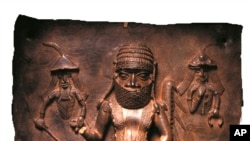The Horniman said Nigeria's National Commission for Museums and Monuments (NCMM) had requested the return of the artefacts at the beginning of the year.
"The evidence is very clear that these objects were acquired through force, and external consultation supported our view that it is both moral and appropriate to return their ownership to Nigeria," said Eve Salomon, chair of the trustees of the Horniman Museum and Gardens.
The Horniman said Nigeria's National Commission for Museums and Monuments (NCMM) had requested the return of the artefacts at the beginning of the year.
"The evidence is very clear that these objects were acquired through force, and external consultation supported our view that it is both moral and appropriate to return their ownership to Nigeria," said Eve Salomon, chair of the trustees of the Horniman Museum and Gardens.
NCMM Director-General Abba Tijani welcomed the decision, saying he looked forward to discussing loan agreements and collaborations with the Horniman.
Created from brass and bronze in the once mighty Kingdom of Benin in what is now southwestern Nigeria from at least the 16th century onwards, the Benin Bronzes are among Africa's most culturally significant artefacts.
They were seized, along with thousands of other items, in a British military incursion, and ended up in museums in Europe and the United States.
African countries have battled for years to recover works pillaged by explorers and colonisers, while Western institutions are grappling with the cultural legacies of colonialism.
German authorities last month returned the first of more than 1,100 priceless sculptures to Nigeria, following examples set by Jesus College at Cambridge University and the Quai Branly museum in Paris last year.
The returns are likely to increase pressure on the British Museum in London, which holds by far the largest and most significant collection of Benin Bronzes.
